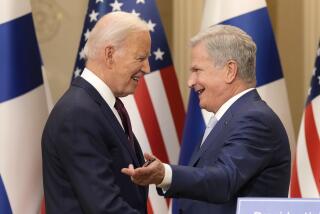Reagan Hails Pact, Readies Bid to Senate
- Share via
WASHINGTON — President Reagan on Thursday night hailed the U.S.-Soviet agreement to ban intermediate-range nuclear missiles as a monument to American persistence and consistency in arms negotiations, declaring that the United States now has a “far broader agenda” in its relations with the Soviet Union.
He said that he had summoned congressional leaders to the White House for a meeting this morning to launch his drive to win Senate ratification for the first arms agreement calling for an outright reduction in nuclear weapons.
“I am confident,” he declared, “that the Senate will now act in an expeditious way to fulfill its duty under our Constitution.”
The President opened his 22-minute nationally televised report on the three-day meeting moments after Soviet leader Mikhail S. Gorbachev took off from Andrews Air Force Base in Maryland, bound for East Berlin.
At the same time he expressed satisfaction with the new arms accord and spoke optimistically of another agreement to reduce strategic missiles by 50%, he said he made it clear that the United States will continue to pursue the controversial Strategic Defense Initiative, popularly known as “Star Wars.”
“I believe deep reduction in these offensive weapons--along with the development of SDI--would do much to make the world safer,” he said. “For that reason, I made it clear that our SDI program will continue and that when we have a defense ready to deploy, we will do so.”
Calls Summit a Success
More than a summary of the summit, which he characterized as a “clear success,” the President’s remarks were an effort to mollify conservatives disappointed in the arms treaty and unnerved by the flood of favorable comment during the summit talks on Gorbachev himself.
Even though the United States will remove 436 nuclear warheads now deployed in Europe, he stressed that the nuclear deterrent of the North Atlantic Treaty Organization will remain potent.
“In fact,” he said, “we will maintain a substantial deterrent force on the ground, in the air and at sea. Our commitment to NATO’s strategy of being able to respond as necessary to any form of aggression remains steadfast.”
He labeled the verification provisions in the treaty, allowing on-site and short-notice inspections of potential deployment sites and assembly facilities, a “breakthrough.”
“Here, then, is a treaty that shows how persistence and consistency eventually can pay off in arms negotiations.”
Private Conversations
Because the two sides had reached agreement on the intermediate-range missile treaty before Gorbachev arrived here late Monday, much of the private talk between the two leaders turned on other subjects, where the accomplishments were far less spectacular.
While there was no meeting of minds on conflicts in Afghanistan, the Persian Gulf, Cambodia, Angola or Nicaragua, Reagan said he has high hopes “that we can have real cooperation in resolving regional conflicts on terms that promote peace and freedom.”
In the field of human rights, he said, there was only “some very limited movement.” The human rights issue, which brought 200,000 demonstrators to the streets of Washington the day before Gorbachev’s arrival, was the one that provoked the Soviet leader to noticeable irritation.
In sharp contrast to the grim ending of the Iceland summit last year, the President, like Gorbachev, spoke confidently of the two countries now moving toward a more steady negotiating relationship.
Relations Broadened
Even more important than the arms agreement or any specific understanding, the President declared, was the summit’s broadening of U.S.-Soviet relations.
“Dealing then with the deeper sources of conflict between nations and systems of government is a practical and moral imperative,” he said. “That is why it was vital to establish a broader summit agenda, one that dealt not only with arms reductions but also people-to-people contacts between our nations and--most important--the issues of human rights and regional conflicts.”
Before the meeting, there were predictions that it could produce a breakthrough on the conflict in Afghanistan, which did not come, but Reagan said Thursday night he had been assured by Gorbachev that “we can have real cooperation in resolving regional conflicts on terms that promote peace and freedom.”
And in human rights, Reagan cited the “resolution of a number of individual cases in which prisoners will be released or exit visas granted.” Although the Soviet refusal to allow the emigration of hundreds of thousands of Jews remains a major source of frustration, he said “there were assurances of future, more substantial movement.”
Conventional Arms Concerns
As he moved to reassure arms treaty skeptics by stressing the strength of the agreement’s verification provisions, Reagan also stressed his awareness of deep concerns over the conventional arms superiority of Warsaw Pact forces.
He and Gorbachev were agreed, he said, that as nuclear weapons are reduced, “it becomes all the more important to redress the disparities in conventional and chemical weapons, where the Soviets now enjoy significant advantages over the United States and our allies.”
In Congress, the issue of conventional forces is expected to be explored by the Senate Armed Services Committee, along with the INF treaty, although the responsibility for the ratification debate falls with the Foreign Relations Committee.
Secretary of State George P. Shultz will lead off testimony before the Armed Services panel when Congress returns in mid-January, and Senate Majority Leader Robert C. Byrd (D-W. Va.) has said he hopes to have the agreement ratified by April.
That timetable would have final approval completed before Reagan goes to Moscow to meet Gorbachev for the fourth time in three years.
“Mr. Gorbachev and I have agreed in several months in Moscow to continue what we have achieved in these past three days,” Reagan concluded Thursday night. “I believe there is reason for both hope and optimism.”
More to Read
Get the L.A. Times Politics newsletter
Deeply reported insights into legislation, politics and policy from Sacramento, Washington and beyond. In your inbox twice per week.
You may occasionally receive promotional content from the Los Angeles Times.










